外研版(2019)高中英语必修第三册Unit6 Disaster and Hope-Developing ideas-writing课件32张PPT
文档属性
| 名称 | 外研版(2019)高中英语必修第三册Unit6 Disaster and Hope-Developing ideas-writing课件32张PPT | 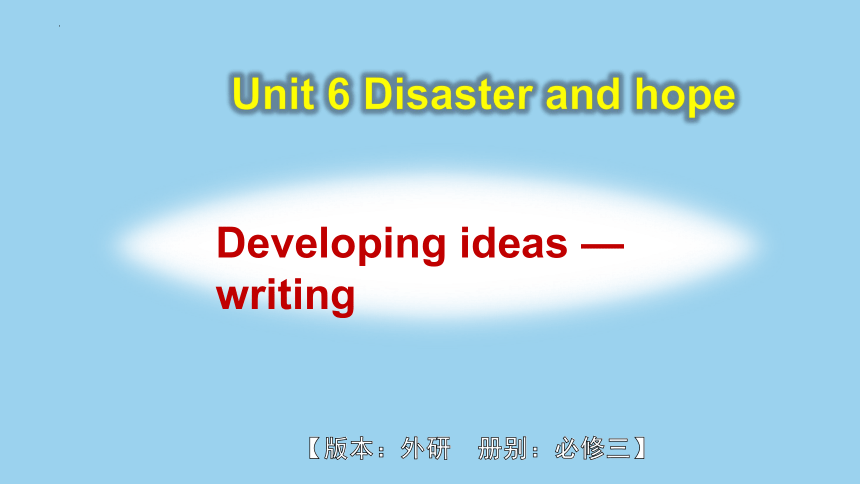 | |
| 格式 | zip | ||
| 文件大小 | 9.9MB | ||
| 资源类型 | 教案 | ||
| 版本资源 | 外研版(2019) | ||
| 科目 | 英语 | ||
| 更新时间 | 2022-05-29 17:01:59 | ||
图片预览

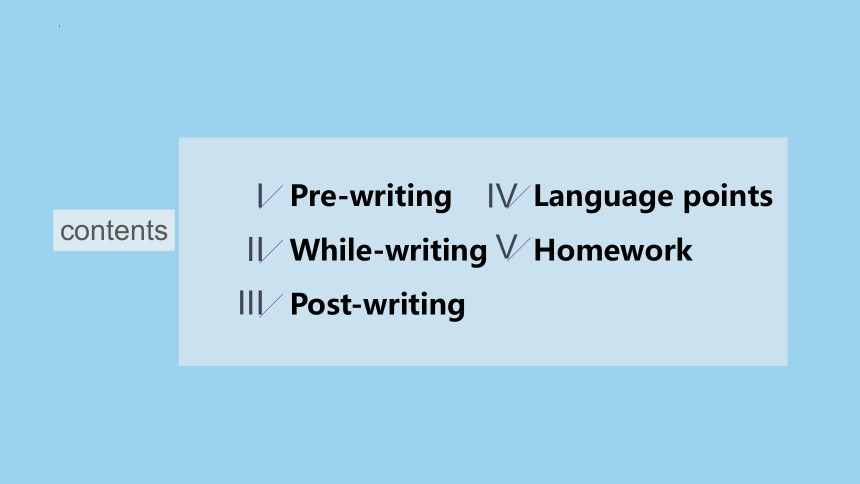
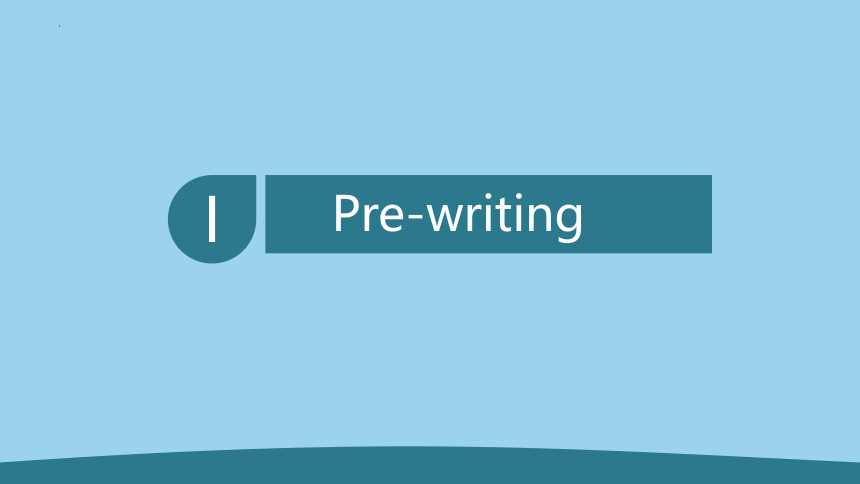
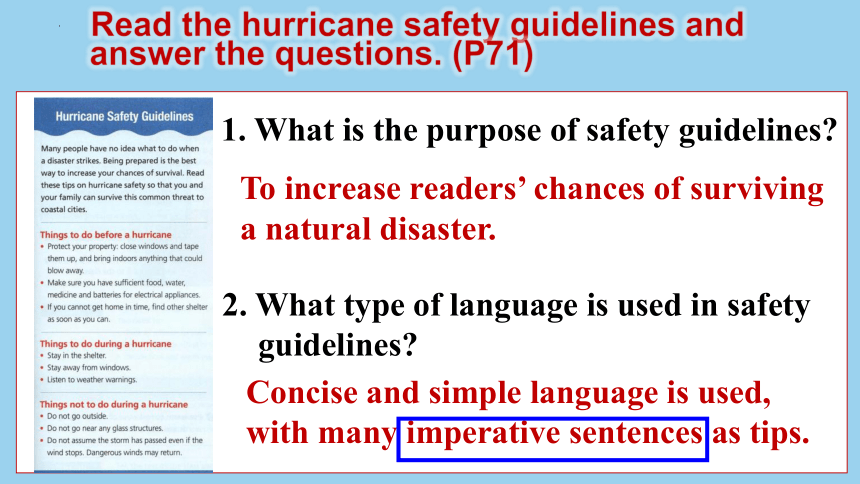
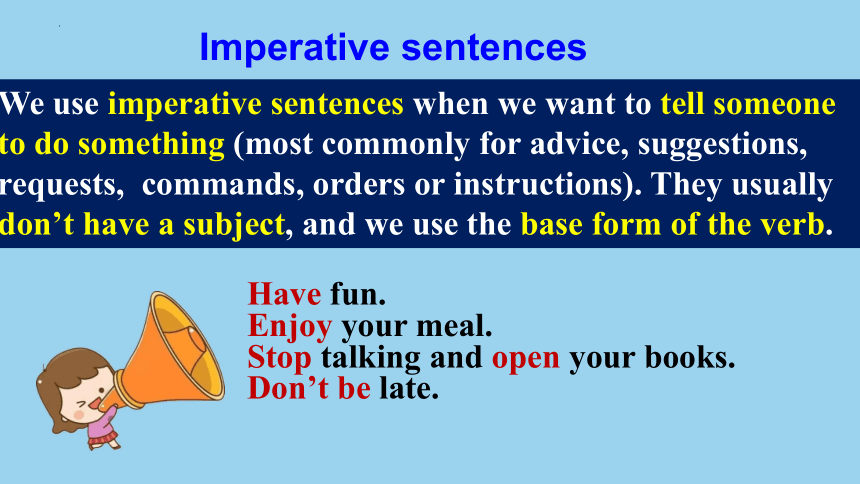
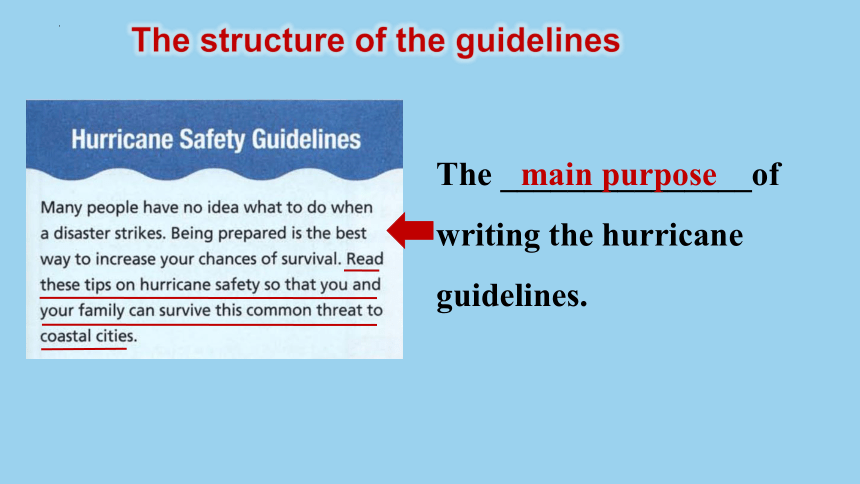
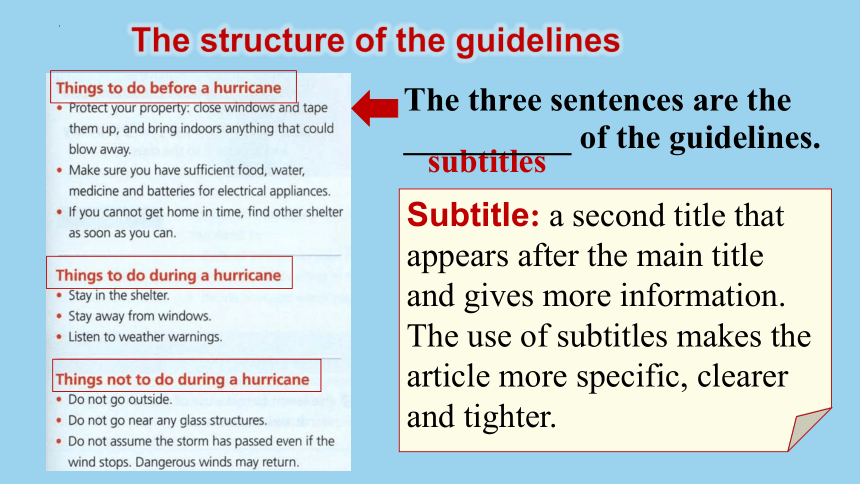
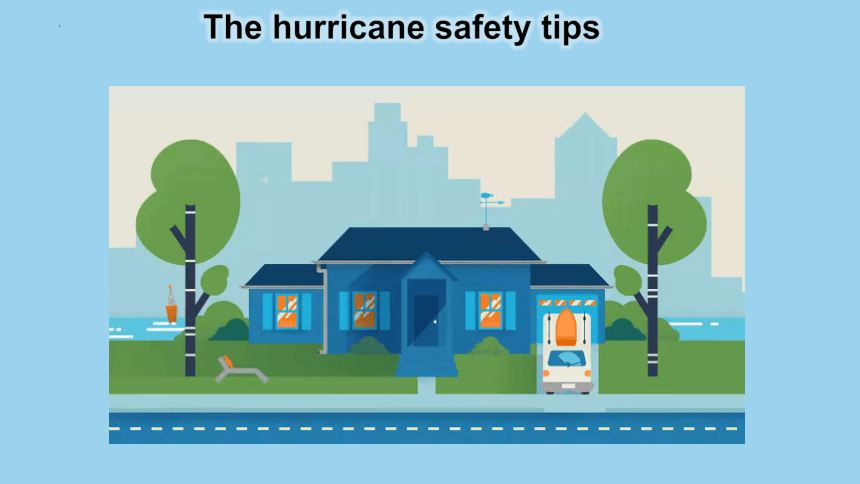
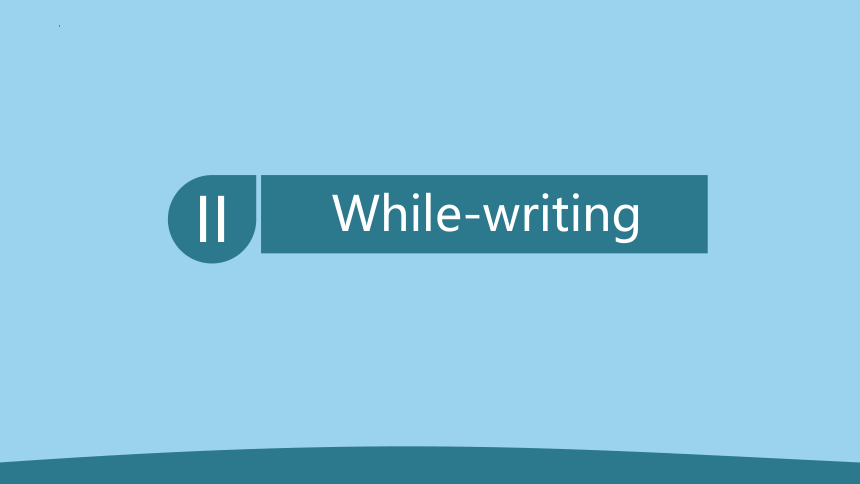
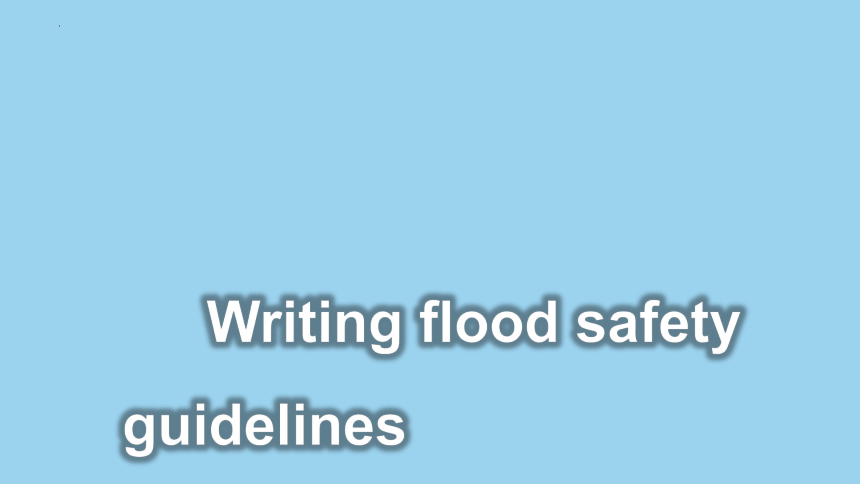
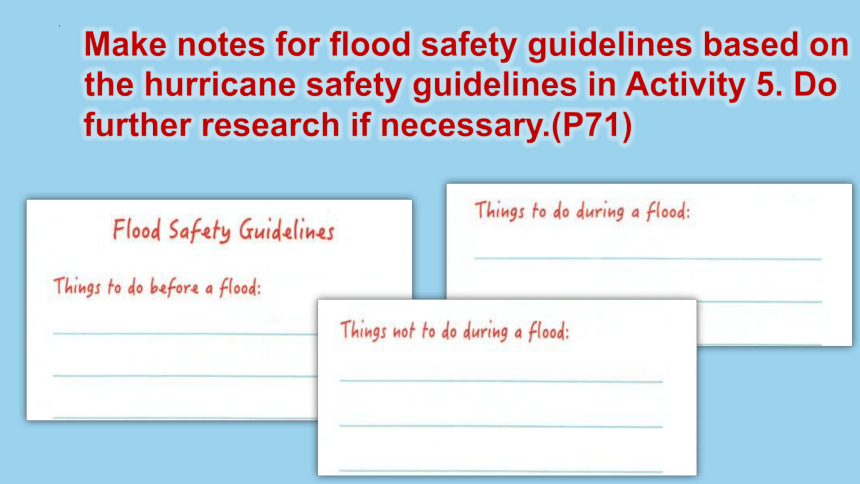
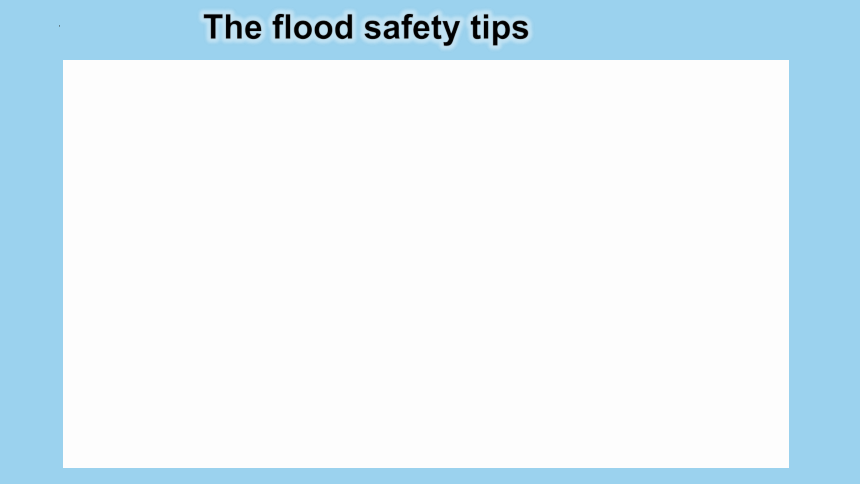
文档简介
(共32张PPT)
Developing ideas — writing
Unit 6 Disaster and hope
【版本:外研 册别:必修三】
contents
Pre-writing
I
Language points
IV
While-writing
II
Homework
V
Post-writing
III
I
Pre-writing
Read the hurricane safety guidelines and answer the questions. (P71)
1. What is the purpose of safety guidelines
2. What type of language is used in safety
guidelines
To increase readers’ chances of surviving a natural disaster.
Concise and simple language is used, with many imperative sentences as tips.
We use imperative sentences when we want to tell someone to do something (most commonly for advice, suggestions, requests, commands, orders or instructions). They usually don’t have a subject, and we use the base form of the verb.
Imperative sentences
Have fun.
Enjoy your meal.
Stop talking and open your books.
Don’t be late.
The structure of the guidelines
The _______________of writing the hurricane guidelines.
main purpose
The structure of the guidelines
subtitles
The three sentences are the __________ of the guidelines.
Subtitle: a second title that appears after the main title and gives more information. The use of subtitles makes the article more specific, clearer and tighter.
The hurricane safety tips
II
While-writing
Writing flood safety guidelines
Make notes for flood safety guidelines based on the hurricane safety guidelines in Activity 5. Do further research if necessary.(P71)
The flood safety tips
Flood safety guidelines
Things to do before a flood:
____________________________________________________________________________________________________________________________________________________________________________________________________________________________________________________________
. Listen to the weather warnings.
. Move to a safe place immediately if there is
an order.
. Prepare enough food and clean water.
. Remember to prepare a safeguard and a first
aid kit.
Flood safety guidelines
Things to do during a flood:
__________________________________________________________________________________________________________________________________________________________________________________________________________________
. Try to move to a place high enough to keep clear
of floodwater, like the top floor, the roof …
. Hold to a tree or a wood block if you are in water.
. Keep away from electricity.
Flood safety guidelines
Things not to do during a flood:
__________________________________________________________________________________________________________________________________________________________________________________________________________________
. Do not drink floodwater as it is dangerous.
. Do not take too many personal belongings with
you.
. Never give up hope.
Useful expressions
The first thing to do is …
Do not …
Never …
Remember (not) to …
Try to …
It’s important (not) to …
III
Post-writing
Exchange drafts
Use the checklist to give feedback on your partner’s draft.
□ Do the guidelines include the key points
□ Are the guidelines organized according to the
layout offered
□ How is the language
□ How is the handwriting
□ How is the paper design
Revise your draft!
Share your guidelines!
Flood Safety Guidelines
Flood is one of the most dangerous natural disasters. It may come suddenly and sweep away everything. It is important to learn some safety guidelines and get prepared for a flood, especially for those living near a river. Here are some tips on flood safety.
. The first thing to do is listen to the weather warnings.
. Move to a safe place immediately if there is an order.
. Prepare enough food and clean water.
. Remember to prepare a safeguard and a first aid kit.
Reference Text
Things to do before a flood:
冲走
自然灾害
有准备;防范
立即,马上
急救箱
保护措施
. Try to move to a place high enough to keep clear of floodwater,
such as the top floor of a building, the roof, etc.
. Hold to a tree or a wood block if you are in water.
. It is important to keep away from electricity.
. Do not drink floodwater as it is not clean.
. Do not take too many personal belongings with you.
. Never give up hope.
Reference Text
Things to do during a flood:
Things not to do during a flood:
不接触
一块木头
远离
所有物
IV
Language points
Strike v (struck, struck)
1)打,撞击
The ship struck a rock.
2)突然想到
An awful thought has just struck me.
It struck me how we could transfer the situation.
3)给(某人)印象
It strikes me that nobody is really in favor of the changes.
4)罢工
The union has voted to strike for a pay increase of 6%.
2. prepare v (prepared - prepared)
1)使做好准备,把……预备好
A hotel room is being prepared for them.
2)使(自己)有准备,有防范
The whole class is working hard preparing for the exams.
The police are preparing themselves for trouble at the demonstration.
警察正在准备防范示威时可能出现的骚乱。
3)预备(饭菜)
He was in the kitchen preparing lunch.
n preparation
The country is making preparations for war.
The team has been training hard in preparation for the big game.
adj prepared
We are not prepared to accept these conditions.
to make threat against somebody 对某人进行威胁
under threat 受到威胁
threaten v
1) 威胁 threaten sb with sth / threaten to do sth
The attacker threatened them with a gun.
2) 有……危险 A storm is threatening.
3) 危及 Pollution is threatening marine life (海洋生物).
She is prepared to carry out her threat to resign.
她以辞职作为要挟,已准备好付诸行动。
3. threat n 威胁,恐吓
threatened adj 受到威胁的
4. tape v
1) 把……录到磁带上 2) 用胶带粘住,用带子系紧
Put it in a box and tape it up securely.
5. sufficient adj 足够的;充足的
These reasons are not sufficient to justify the ban.
这些理由不足以证明实施禁令有理。
sufficiency n 足量,充足
6. assume v 假定;假设;认为
It is reasonable to assume that the economy will continue to improve.
It is generally assumed that (普遍认为) stress is caused by too much work.
V
Homework
Do some research online and find a story about hope in face of plete the notes with information about your story.
Thanks
Developing ideas — writing
Unit 6 Disaster and hope
【版本:外研 册别:必修三】
contents
Pre-writing
I
Language points
IV
While-writing
II
Homework
V
Post-writing
III
I
Pre-writing
Read the hurricane safety guidelines and answer the questions. (P71)
1. What is the purpose of safety guidelines
2. What type of language is used in safety
guidelines
To increase readers’ chances of surviving a natural disaster.
Concise and simple language is used, with many imperative sentences as tips.
We use imperative sentences when we want to tell someone to do something (most commonly for advice, suggestions, requests, commands, orders or instructions). They usually don’t have a subject, and we use the base form of the verb.
Imperative sentences
Have fun.
Enjoy your meal.
Stop talking and open your books.
Don’t be late.
The structure of the guidelines
The _______________of writing the hurricane guidelines.
main purpose
The structure of the guidelines
subtitles
The three sentences are the __________ of the guidelines.
Subtitle: a second title that appears after the main title and gives more information. The use of subtitles makes the article more specific, clearer and tighter.
The hurricane safety tips
II
While-writing
Writing flood safety guidelines
Make notes for flood safety guidelines based on the hurricane safety guidelines in Activity 5. Do further research if necessary.(P71)
The flood safety tips
Flood safety guidelines
Things to do before a flood:
____________________________________________________________________________________________________________________________________________________________________________________________________________________________________________________________
. Listen to the weather warnings.
. Move to a safe place immediately if there is
an order.
. Prepare enough food and clean water.
. Remember to prepare a safeguard and a first
aid kit.
Flood safety guidelines
Things to do during a flood:
__________________________________________________________________________________________________________________________________________________________________________________________________________________
. Try to move to a place high enough to keep clear
of floodwater, like the top floor, the roof …
. Hold to a tree or a wood block if you are in water.
. Keep away from electricity.
Flood safety guidelines
Things not to do during a flood:
__________________________________________________________________________________________________________________________________________________________________________________________________________________
. Do not drink floodwater as it is dangerous.
. Do not take too many personal belongings with
you.
. Never give up hope.
Useful expressions
The first thing to do is …
Do not …
Never …
Remember (not) to …
Try to …
It’s important (not) to …
III
Post-writing
Exchange drafts
Use the checklist to give feedback on your partner’s draft.
□ Do the guidelines include the key points
□ Are the guidelines organized according to the
layout offered
□ How is the language
□ How is the handwriting
□ How is the paper design
Revise your draft!
Share your guidelines!
Flood Safety Guidelines
Flood is one of the most dangerous natural disasters. It may come suddenly and sweep away everything. It is important to learn some safety guidelines and get prepared for a flood, especially for those living near a river. Here are some tips on flood safety.
. The first thing to do is listen to the weather warnings.
. Move to a safe place immediately if there is an order.
. Prepare enough food and clean water.
. Remember to prepare a safeguard and a first aid kit.
Reference Text
Things to do before a flood:
冲走
自然灾害
有准备;防范
立即,马上
急救箱
保护措施
. Try to move to a place high enough to keep clear of floodwater,
such as the top floor of a building, the roof, etc.
. Hold to a tree or a wood block if you are in water.
. It is important to keep away from electricity.
. Do not drink floodwater as it is not clean.
. Do not take too many personal belongings with you.
. Never give up hope.
Reference Text
Things to do during a flood:
Things not to do during a flood:
不接触
一块木头
远离
所有物
IV
Language points
Strike v (struck, struck)
1)打,撞击
The ship struck a rock.
2)突然想到
An awful thought has just struck me.
It struck me how we could transfer the situation.
3)给(某人)印象
It strikes me that nobody is really in favor of the changes.
4)罢工
The union has voted to strike for a pay increase of 6%.
2. prepare v (prepared - prepared)
1)使做好准备,把……预备好
A hotel room is being prepared for them.
2)使(自己)有准备,有防范
The whole class is working hard preparing for the exams.
The police are preparing themselves for trouble at the demonstration.
警察正在准备防范示威时可能出现的骚乱。
3)预备(饭菜)
He was in the kitchen preparing lunch.
n preparation
The country is making preparations for war.
The team has been training hard in preparation for the big game.
adj prepared
We are not prepared to accept these conditions.
to make threat against somebody 对某人进行威胁
under threat 受到威胁
threaten v
1) 威胁 threaten sb with sth / threaten to do sth
The attacker threatened them with a gun.
2) 有……危险 A storm is threatening.
3) 危及 Pollution is threatening marine life (海洋生物).
She is prepared to carry out her threat to resign.
她以辞职作为要挟,已准备好付诸行动。
3. threat n 威胁,恐吓
threatened adj 受到威胁的
4. tape v
1) 把……录到磁带上 2) 用胶带粘住,用带子系紧
Put it in a box and tape it up securely.
5. sufficient adj 足够的;充足的
These reasons are not sufficient to justify the ban.
这些理由不足以证明实施禁令有理。
sufficiency n 足量,充足
6. assume v 假定;假设;认为
It is reasonable to assume that the economy will continue to improve.
It is generally assumed that (普遍认为) stress is caused by too much work.
V
Homework
Do some research online and find a story about hope in face of plete the notes with information about your story.
Thanks
